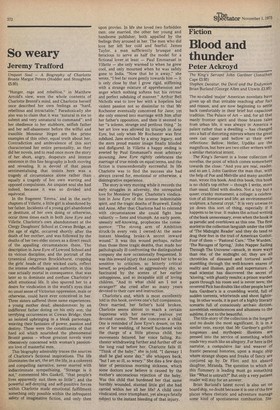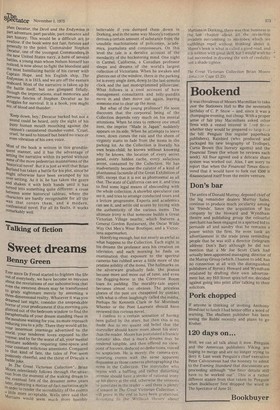Fiction
Blood and thunder
Peter Ackroyd
The King's Servant John Gardner (Jonathan Cape £3.95) Stephen Decatur, the Devil and the Endymion Brian Burland (George Allen and Unwin £3.95)
The so-called 'major' American novelists have given up all that irritable reaching after fact and reason, and are now beginning to settle back comfortably in their brief but capacious tradition. The Palace of Art — and, for all that manly frontier spirit and those brazen tales from urban life, it was always in America a palace rather than a dwelling — has changed into a hall of distorting mirrors where the great ones can caper and bellow at their own reflections: Bellow, Heller, Updike are the magnificos, but here are two other writers with a similar rhetorical intent.
The King's Servant is a loose collection of novellas, the point of which comes somewhere towards the close: "And you are real, reader, and so am I, John Gardner the man that, with the help of Poe and Melville and many another man, wrote this book. And this book, this book is no child's top either — though I write, more than usual, filled with doubts. Not a toy but a queer, cranky monument, a collage: a celebration of all literature and life; an environmental sculpture, a funeral crypt." It is very unwise to jot down this sort of thing, especially if it happens to be true. It makes the actual writing of the book unnecessary, even when the book is as parodic and overblown as this one. The first stories in the collection languish under the title of 'The Midnight Reader' and they do tend to drag their feet in the trail of American Gothic. Four of them — 'Pastoral Care,' The Warden,' `The Ravages of Spring,' 'John Napper Sailing Through The Universe'—smack, in more ways than one, of the midnight oil; they are all chronicles of diseased and tortured souls stumbling through the well-known snares of reality and illusion, guilt and supernature. A mad scientist has discovered the secret of `kloning,' with ghastly results; a prison warden paces through his room and is never seen; the reverend Pick has doubts like other people have hats. Gardner's is a crumbling world, full of sudden torrents, whirlwinds and sheet lightning. In other words, it is part of a highly literary scenario full of consciously archaic diction, novelettish reminiscences and allusions to the sublime, if not to the beautiful.
The title-story of the collection is the longest and no doubt the most significant. It is in a similar vein, except that Mr Gardner's gothic longueurs and mythopeie illusions are pressed into the service of something which reads very much like an allegory. For here is the narrator, a compulsive liar and weaver of frantic personal histories, upon a magic ship where strange shapes and freaks of fancy are conjured up by Dr Flint and his absurd daughter, Miranda. The question to which all this flummery is leading must go something like "What is untruth?" But only a very patient reader will stay for an answer.
Brian Burland's latest novel is also set on board ship, no doubt because it is one of the few places where rhetoric and adventure manage some kind of spontaneous combustion. Ste phen Decatur, the Devil and the Endymion is Part adventure, part parable, part romance and Part history. This would be a difficult act to swallow, if the book were not fast, furious and generally to the point. Commander Stephen Decatur, one of the youngest Commanders,in the new United States navy, a hero of several battles, a young man whom Nelson himself has noticed, is now about to fight the bloodiest and the most humiliating battle of his career with Captain Hope, and his English ship, The Endymion; it is 1815, and we are off the eastern seaboard. Most of the narrative is taken up by the battle itself, but one glimpsed fitfully, through the imprecations, mad memories and Perverse fancies of Stephen Decatur as he struggles for survival. It is a book, you might Say, of blood and thunder:
'Keep down, boy,' Decatur barked but not a sound could be heard, only the sight of his Puny human mouth mouthing against the cannon's cannistered thunder-vomit. 'Cruel, cruel,' he said to himself but heard no trace or even vibration of his own voice.
Most of the book is written in this grandiloquent manner, and it has the advantage of setting the narrative within its period without some of the more pedestrian mannerisms of the 'historical novel'. But it is just as well that Brian Burland has taken a battle for his plot, since he might otherwise have been swamped by his over-writing. As it is, he has taken the genre and shaken it with both hands until it has turned into something quite different: a cross between some historical tableau, where the characters are hardly recognisable for all the wax that covers them, and a modern, confessional novel. For all its faults, it works remarkably well.

































 Previous page
Previous page